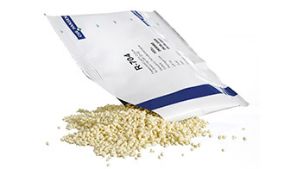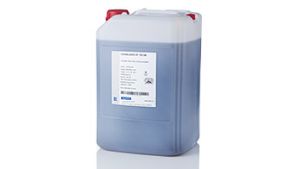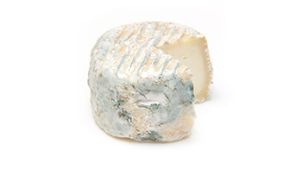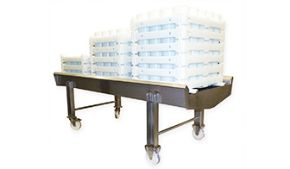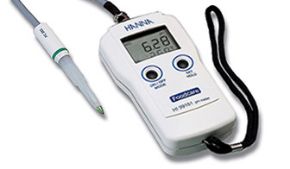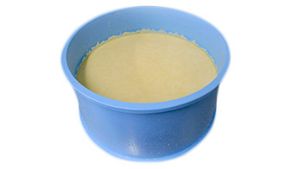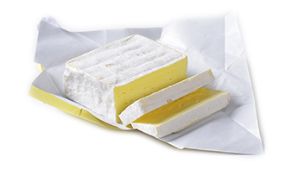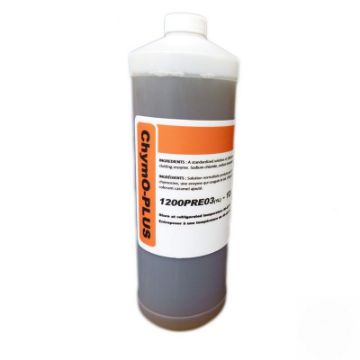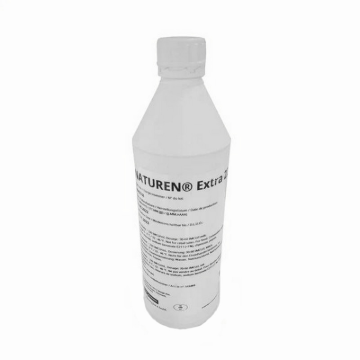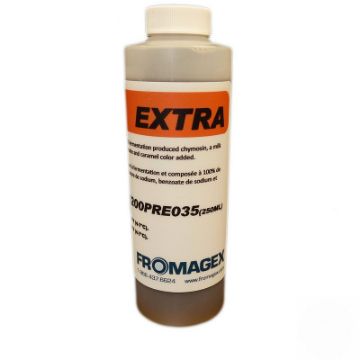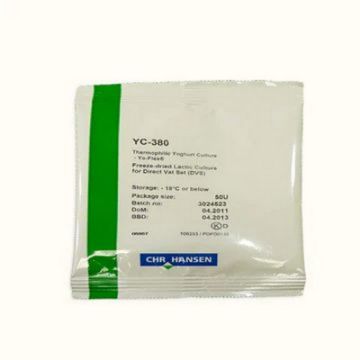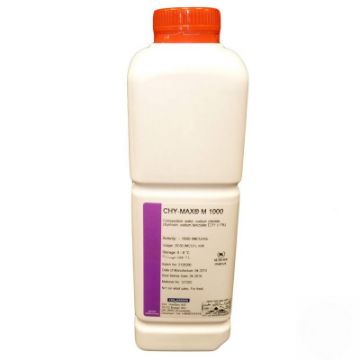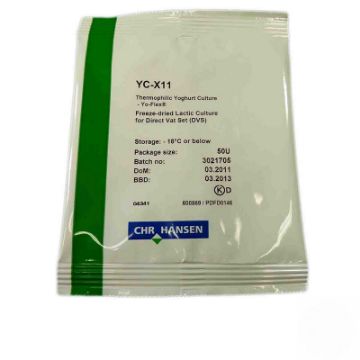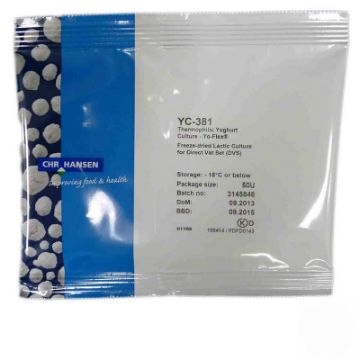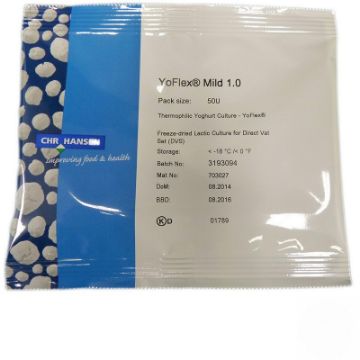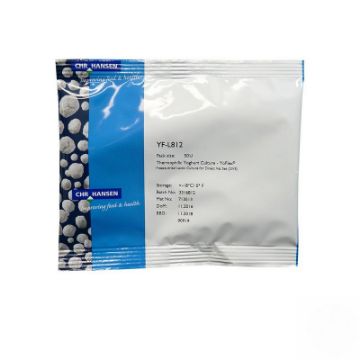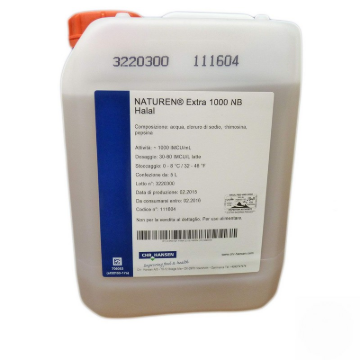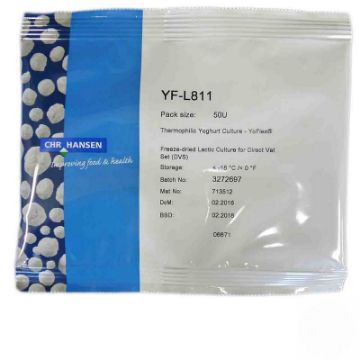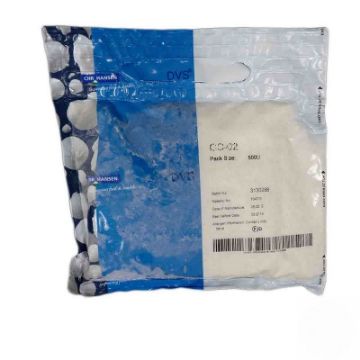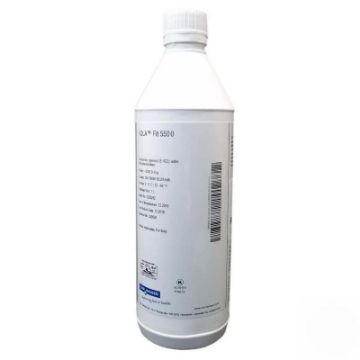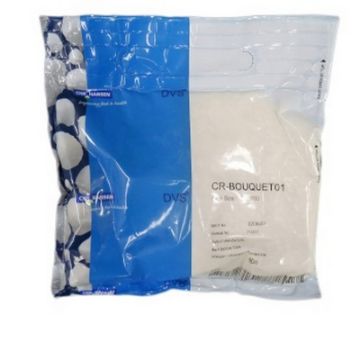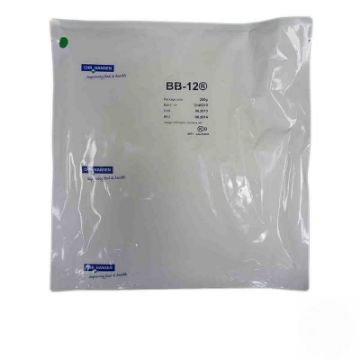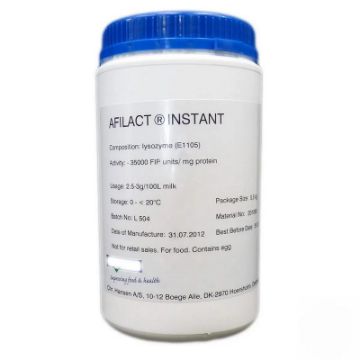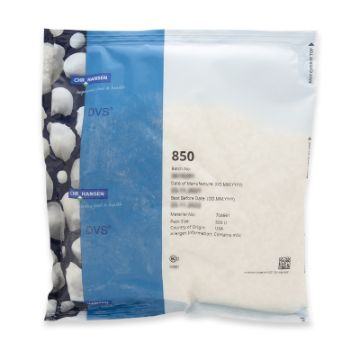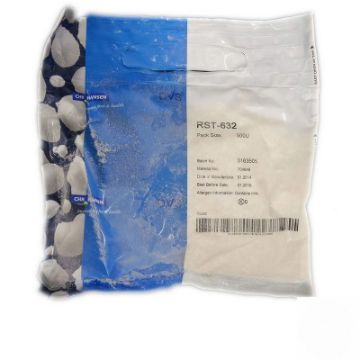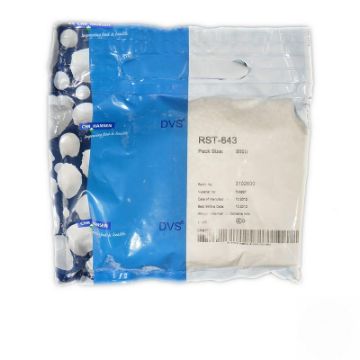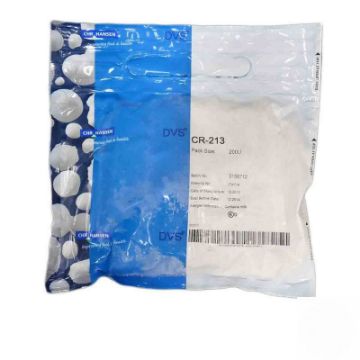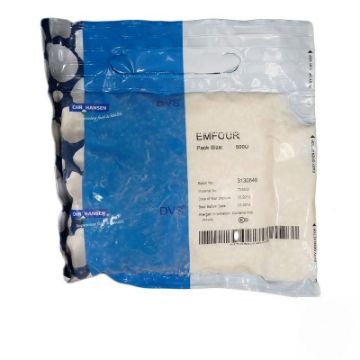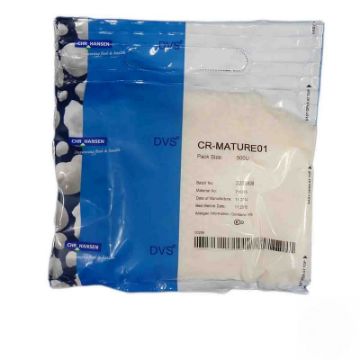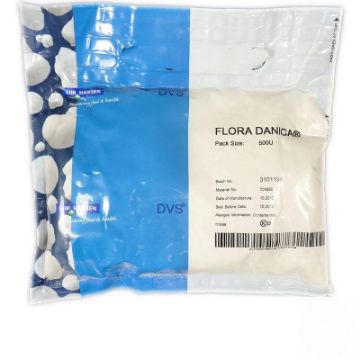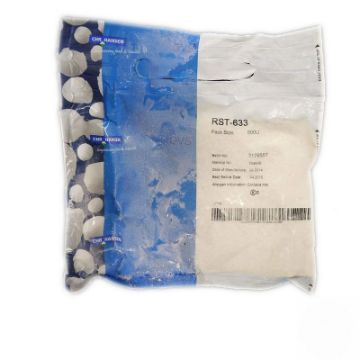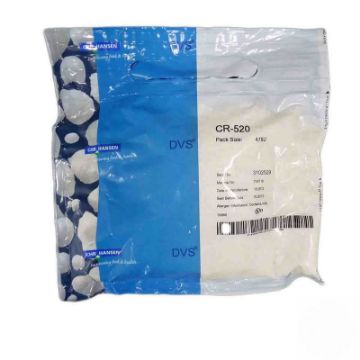Chr Hansen
Chr Hansen branded products
Natural rennet NATUREN® Extra 220 1 L
NATUREN® Extra 220 is a standardized rennet manufactured from extracts of the fourth stomach of calves.
The product contains a milk-clotting enzyme which is highly specific for kappa-casein, resulting in very good curd formation.
The general proteolytic activity also has a significant influence on the flavor and texture development of cheeses.
The active milk-coagulating enzymes are chymosin (EC 3.4.23.4) and bovine pepsin (EC 3.
4.
23.
1).
YC-380 Freeze-dried 50 u
Thermophilic YoFlex® culture.
The culture will produce yoghurt with strong flavor, medium viscosity and some post-acidification.
Suitable for cup set, stirred and drinking yoghurt.
YC-X11 Freeze-dried 50 u
Thermophilic YoFlex® culture.
The culture will produce yoghurt with mild flavor, high viscosity and low post-acidification.
Suitable for cup set, stirred and drinking yoghurt.
YC-381 Freeze-dried 50 u
Thermophilic YoFlex® culture.
The culture will produce yoghurt with strong flavor, high viscosity and some postacidification.
Suitable for cup set, stirred and drinking yoghurt.
YoFlex Mild 1.0 Freeze-dried 50 u
Mesophilic aromatic culture, type LD.
The culture produces flavor and CO2.
This range provides cultures with fast acidification properties at a low inoculation rate.
The culture is primarily used in the manufacturing of Continental semi-hard cheese varieties with eyes, e.g. Gouda, Edam, Leerdam and Havarti.
YF-L812 Freeze-dried 50 u
Thermophilic YoFlex® culture.
The culture will produce yoghurt with very mild flavor, extra high viscosity and very low post-acidification.
Suitable for cup set, stirred and drinking yoghurt.
Natural rennet NATUREN® Extra 1000 NB Halal 5 L
NATUREN® Extra 1000 NB Halal is a standardized rennet manufactured from extracts of the fourth stomach of calves and/or adult bovines.
NB indicates that this product is formulated with No Benzoate added.
As benzoate helps maintain the microbial quality of liquid enzyme products, Chr.Hansen strongly advises customers to adhere to the recommended storage and transportation temperatures for NB products.
If this is not possible, a benzoate-free powder product or liquid formulated with benzoate should be used.
The product contains a milk-clotting enzyme which is highly specific for kappa-casein, resulting in very good curd formation.
The general proteolitic activity also has a significant influence on the flavor and texture development of cheeses.
The active milk-coagulating enzymes are chymosin (EC 3.4.23.4) and bovine pepsin (EC 3.
4.
23.
1).
YF-L811 Freeze-dried 50 u
Thermophilic YoFlex® culture.
The culture will produce yoghurt with very mild flavor, very high viscosity and very low post-acidification.
Suitable for cup set, stirred and drinking youghurt.
CC-02 Frozen 500 u
Mesophilic homofermentative culture, type O.
This culture contains specially selected strains chosen for their phage resistance and ability to produce lactic acid quickly.
This culture does not produce CO2.
NOLA™ Fit 5500 Lactase, 1 L
NOLA™ Fit 5500 is a novel highly-purified and standardized liquid wide spectrum Bifidobacterium bifidum ß-galactosidase (lactase).
It is produced by submerged fermentation on a vegetable substrate using a selected strain of Bacillus licheniformis kept under contained conditions and not present in the final product.
The product hydrolyses lactose to a mixture of glucose and galactose.
The product is a premium lactase particularly suitable for fermented milks and cheese manufacture and to avoid off-flavor typically associated with lactose free UHT/ESL milk products.
CR-BOUQUET 01 Frozen 500 u
A defined adjunct culture blend which enhances the overall flavor intensity of the cheese by accentuating important flavor notes.
It enhances the balanced, mellow, rounded and clean flavors and suppresses unwanted flavors like sour, bitter and flat.
The culture contains a nisin producing strain for promotion of bacteria lysis.
BB-12 Frozen 250 g (Probiotic)
Thermophilic lactic acid culture.
The culture is a defined single strain with a long history of safe use.
Substantial clinical documentation on possible health benefits are avaliable upon request and likewise are certificates of identification and certificates of safety and origin.
BB-12® is a registred trademark of Chr.Hansen.
DVS-850 Congelé 500u
This Chr. Hansen DVS® culture contains defined mesophilic strains and is for continuous direct vat set use.
RST-632 Frozen 500 u
This Chr.Hansen DVS® culture contains defined mesophilic and thermophilic strains and is for continous direct vat set use.
The culture provides fast lactic acid production and high phage robustness without any CO2 production (homofermentative).
The culture is primarily applied in the production of semi-hard, hard and very hard pressed cheeses with a closed texture and a min cooking temperature at 35°C (95°F).
Examples of applications are Cheddar, Cheshire, Colby, Monterey Jack, Munster, Fontal, Raclette & Saint Paulin.
RST-643 Frozen 500 u
This Chr.Hansen DVS® culture contains defined mesophilic and thermophilic strains and is for continous direct vat set use.
The culture provides fast lactic acid production and high phage robustness without any CO2 production (homofermentative).
The culture is primarily applied in the production of semi-hard, hard and very hard pressed cheeses with a closed texture and a min cooking temperature at 35°C (95°F).
Examples of applications are Cheddar, Cheshire, Colby, Monterey Jack, Munster, Fontal, Raclette & Saint Paulin.
CR-213 Frozen 200 u
A defined blend of mesophilic homofermentative adjunct culture.
The selection of the culture is based on a unique balanced aminopeptidase composition.
The strains are all isolated from traditionally well known cheese cultures on the criteria that they have no or reduced capability to ferment lactose.
The culture is primarily applied in the production of cheeses where normally mesophilic lactic acid bacteria are used.
This culture is particularly used in Cheddar, Continental cheeses (rindless cheese), low-fat cheese and cheese containing vegetable fat.
The culture enhances the overall flavor intensity of cheese by accentuating all important flavor notes.
It enhances balanced, mellow, rounded and clean flavors and suppresses unwanted flavors such as sour, bitter and flat.
EMFOUR Frozen 500 u
Thermophilic homofermentative culture blend.
In 1984 it was selected by Dutch cheesemakers as the most effective thermophilic culture for accelerating ripening in Dutch cheeses.
The culture significantly enhances mature and nutty flavor notes, and there is a tendency towards sweet, sour and salt tastes, too.
The body of the cheese is also enhanced by the use of EMFOUR.
The culture can reduce the ripening time by several weeks depending on the type of cheese, storage temperature and desired flavor.
CR-MATURE 01 Frozen 500 u
A defined adjunct culture blend which enhances the overall flavor intensity of the cheese by accentuating important flavor notes.
It enhances the balanced, mellow, rounded and clean flavors and suppresses unwanted flavors like sour, bitter and flat.
The culture contains a nisin producing strain for promotion of bacteria lysis.
Some strains are facultative heterofermentative and may produce CO2 in specific conditions.
FLORA-DANICA Frozen 500 u
Mesophilic aromatic culture, type LD.
The culture produces flavor and CO2.
The culture is primarily used in the manufacture of Continental cheese types (Gouda, Edam, Leerdam, Samsoe) and soft cheese types (Lactic cheeses, Camembert, Blue cheese).
RST-633 Frozen 500 u
This Chr.Hansen DVS® culture contains defined mesophilic and thermophilic strains and is for continous direct vat set use.
The culture provides fast lactic acid production and high phage robustness without any CO2 production (homofermentative).
The culture is primarily applied in the production of semi-hard, hard and very hard pressed cheeses with a closed texture and a min cooking temperature at 35°C (95°F).
Examples of applications are Cheddar, Cheshire, Colby, Monterey Jack, Munster, Fontal, Raclette & Saint Paulin.
CR-520 Frozen 475 u
A defined adjunct culture blend which enhances the overall flavor intensity of the cheese by accentuating important flavor notes.
It enhances the balanced, mellow, rounded and clean flavors and suppresses unwanted flavors like sour, bitter and flat.
The culture is primarily applied in the production of cheeses where normally mesophilic lactic acid bacteria are used.
This culture is particularly used in Cheddar, Continental cheeses (rindless cheese), low-fat cheese and cheese containing vegetable fat.

